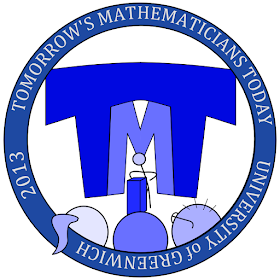(To comment on my recent Gresham College lecture please go to this post.)
Yesterday the University of Greenwich hosted the second UK conference for mathematics undergraduates. Tomorrow's Mathematicians Today 2013. (The first TMT was also held at Greenwich, in 2010.) About 150 students attended, and there were 30 student speakers from 15 different universities, as well as an excellent keynote address by Robin Wilson. The conference was sponsored by the Institute of Mathematics and its Applications, GCHQ (a big employer of mathematicians) and the publishers Taylor and Francis, and the OR Society was also present.
I thought it was a wonderful day. (The programme and abstracts can be found on the conference website.) The atmosphere was remarkable - friendly and supportive of the speakers. The contents of the talks varied enormously. Some students were simply telling us about mathematics that excited them: others were reporting on their own original individual or collaborative work. Some talks were relatively elementary, others sophisticated. But there wasn't a single dud in the sessions I attended. (Sadly, with parallel sessions, one couldn't attend all the talks.)
In the first morning session I learned about applications of category theory in computer science, "funny functions" which show up misconceptions and misintuitions in analysis, and the applied group theory of "speedcubing" - how to find the most ergonomically efficient ways to solve Rubik's cube quickly. Later in the morning I attended talks on Shor's algorithm and the threat quantum computers pose to conventional cryptography, and Conway's Angel and Devil game on an infinite chessboard - a simple game which took thirty years to solve.
In the afternoon I heard three fascinating talks about applications of mathematics in biology and medicine - the strengths and weaknesses of models in epidemiology and in the study of how bacteria move - and about financial mathematics and students' perception of GCSE mathematics. The afternoon ended with Robin Wilson's keynote talk about Euler's life, labours and legacy. The audience was enthusiastic throughout.
The prize for the best paper, sponsored by GCHQ, went to Jason Young of Cardiff University for his talk on "Understanding the Effect of Individual Behaviour in Hierarchical Queues" - about how individuals' selfish or unselfish behavour affects queuing times for everyone. It was an excellent example of interdisciplinary work with real practical consequences leading to insights which might, for example, reduce waiting times for medical treatment.
It was a wonderfully stimulating day. I am sure I am not the only person there who found myself unusually exhausted early last evening. Thinking about mathematics, even as enjoyably as yesterday, is hard work!
Sunday, 17 February 2013
Sunday, 10 February 2013
Are mathematicians and artists opposites?
(To comment on my recent Gresham College lecture please go to this post.)
A newspaper feature today ("My funny Valentine: Do opposites really attract?" in the Independent)
presents as its prime example of the attraction of opposites a couple com[prising an artist and a mathematician.
Are mathematicians and artists really opposites? I know many mathematicians and artists who get on. Why wouldn't they? Both professions require creativity, thinking for oneself, a willingness to challenge (or at least test) received opinion, perseverance in the face of difficulty, preparedness to wait for inspiration, and integrity. And sometimes, perhaps, occasional use of drugs for stimulation (the drug for choice of mathematicians being coffee, and the use generally rather more than occasional.)
The public perception that mathematics is routine drudgery should be challenged! Mathematicians and artists have a lot in common.
A newspaper feature today ("My funny Valentine: Do opposites really attract?" in the Independent)
presents as its prime example of the attraction of opposites a couple com[prising an artist and a mathematician.
Are mathematicians and artists really opposites? I know many mathematicians and artists who get on. Why wouldn't they? Both professions require creativity, thinking for oneself, a willingness to challenge (or at least test) received opinion, perseverance in the face of difficulty, preparedness to wait for inspiration, and integrity. And sometimes, perhaps, occasional use of drugs for stimulation (the drug for choice of mathematicians being coffee, and the use generally rather more than occasional.)
The public perception that mathematics is routine drudgery should be challenged! Mathematicians and artists have a lot in common.
Sunday, 3 February 2013
Gresham College Lectures
On Monday February 4th, I gave the first of a series of three free public lectures on computng and mathematics at Gresham College, Barnards Inn Hall, Holborn, Central London. Any reader of this blog is welcome to attend these lectures.
The first lecture was entitled "Arithmetic by Human and Arithmetic by Computer". Video and audio recordings are available at the Gresham College website. This lecture featured some cool tricks for doing arithmetic, a performing monkey and brilliant Scottish inventions.
The second lecture was "How Computers get it Wrong: 2+2=5". Video and audio recordings are now available at the Gresham College website. This lecture discussed different kinds of computer error.
The third lecture will be given at Gresham College (Barnards Inn Hall, Holborn, central London) on Monday 15th April.
Please post any comments or questions about the lectures as comments on this blog post.
The first lecture was entitled "Arithmetic by Human and Arithmetic by Computer". Video and audio recordings are available at the Gresham College website. This lecture featured some cool tricks for doing arithmetic, a performing monkey and brilliant Scottish inventions.
The second lecture was "How Computers get it Wrong: 2+2=5". Video and audio recordings are now available at the Gresham College website. This lecture discussed different kinds of computer error.
The third lecture will be given at Gresham College (Barnards Inn Hall, Holborn, central London) on Monday 15th April.
Please post any comments or questions about the lectures as comments on this blog post.

